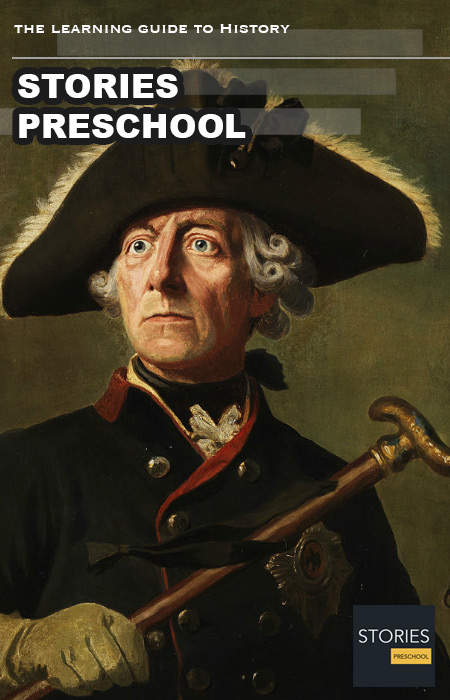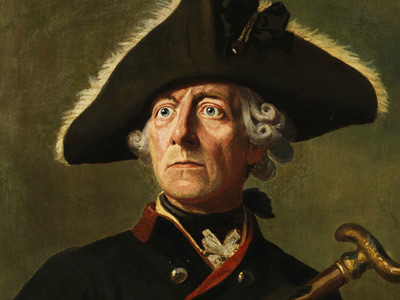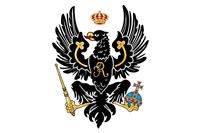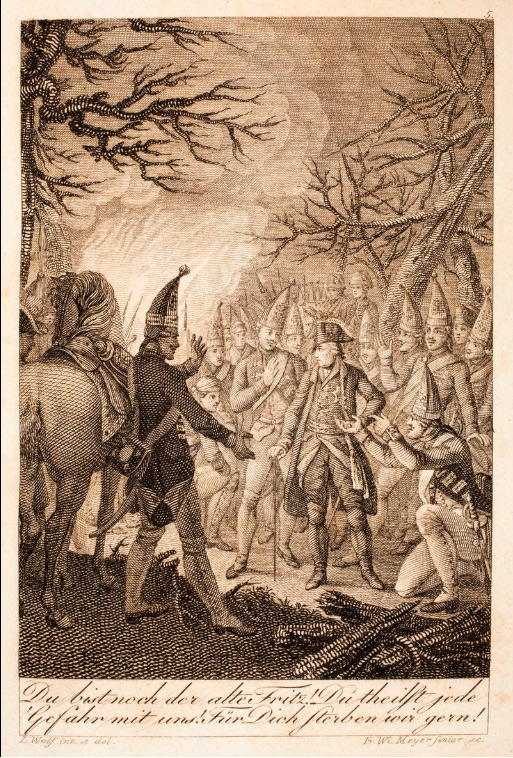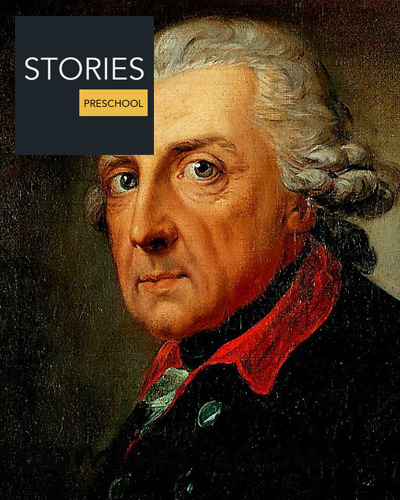Frederick the Great (1712-1786)
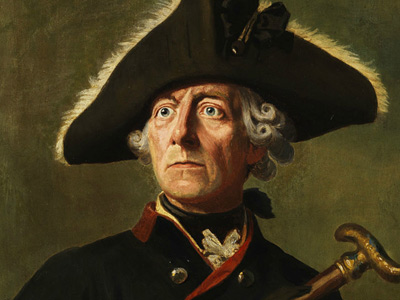
Frederick II (German: Friedrich; 24 January 1712 – 17 August 1786) was King of Prussia from 1740 until 1786, the longest reign of any Hohenzollern king. His most significant accomplishments during his reign included his military victories, his reorganization of Prussian armies, his patronage of the arts and the Enlightenment in Prussia, and his final success against great odds in the Seven Years' War. Frederick was the last Hohenzollern monarch titled King in Prussia and declared himself King of Prussia after achieving full sovereignty for all historical Prussian lands. Prussia had greatly increased its territories and became a leading military power in Europe under his rule. He became known as Frederick the Great (Friedrich der Große) and was affectionately nicknamed Der Alte Fritz ("Old Fritz") by the Prussian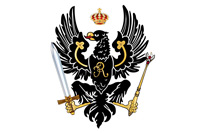 The Kingdom of Prussia was a German kingdom that constituted the state of Prussia between 1701 and 1918. It was the driving force behind the unification of Germany in 1871 and was the leading state of the German Empire until its dissolution in 1918. Although it took its name from the region called Prussia, it was based in the Margraviate of Brandenburg. Its capital was Berlin. and later by all German people.
The Kingdom of Prussia was a German kingdom that constituted the state of Prussia between 1701 and 1918. It was the driving force behind the unification of Germany in 1871 and was the leading state of the German Empire until its dissolution in 1918. Although it took its name from the region called Prussia, it was based in the Margraviate of Brandenburg. Its capital was Berlin. and later by all German people.
In his youth, Frederick was more interested in music and philosophy than the art of war. Nonetheless, upon ascending to the Prussian throne, he attacked Austria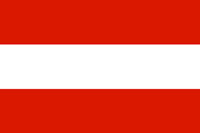 The Archduchy of Austria was a major principality of the Holy Roman Empire and the nucleus of the Habsburg monarchy. With its capital at Vienna, the archduchy was centered at the Empire's southeastern periphery. The archduchy's history as an imperial state ended with the dissolution of the Holy Roman Empire in 1806. It was replaced with the Lower and Upper Austria crown lands of the Austrian Empire. and claimed Silesia during the Silesian Wars, winning military acclaim for himself and Prussia. Toward the end of his reign, Frederick physically connected most of his realm by acquiring Polish territories in the First Partition of Poland. He was an influential military theorist whose analysis emerged from his extensive personal battlefield experience and covered issues of strategy, tactics, mobility and logistics.
The Archduchy of Austria was a major principality of the Holy Roman Empire and the nucleus of the Habsburg monarchy. With its capital at Vienna, the archduchy was centered at the Empire's southeastern periphery. The archduchy's history as an imperial state ended with the dissolution of the Holy Roman Empire in 1806. It was replaced with the Lower and Upper Austria crown lands of the Austrian Empire. and claimed Silesia during the Silesian Wars, winning military acclaim for himself and Prussia. Toward the end of his reign, Frederick physically connected most of his realm by acquiring Polish territories in the First Partition of Poland. He was an influential military theorist whose analysis emerged from his extensive personal battlefield experience and covered issues of strategy, tactics, mobility and logistics.
Considering himself "the first servant of the state," Frederick was a proponent of enlightened absolutism. He modernized the Prussian bureaucracy and civil service and pursued religious policies throughout his realm that ranged from tolerance to segregation. He reformed the judicial system and made it possible for men not of noble stock to become judges and senior bureaucrats. Frederick also encouraged immigrants of various nationalities and faiths to come to Prussia. Some critics, however, point out his oppressive measures against conquered Polish subjects during the First Partition. Frederick supported arts and philosophers he favored, as well as allowing complete freedom of the press and literature. Frederick is buried at his favorite residence, Sanssouci in Potsdam. Because he died childless, Frederick was succeeded by his nephew, Frederick William II, son of his brother, Augustus William.
Nearly all 19th-century German historians made Frederick into a romantic model of a glorified warrior, praising his leadership, administrative efficiency, devotion to duty and success in building up Prussia to a great power in Europe. Historian Leopold von Ranke was unstinting in his praise of Frederick's "Heroic life, inspired by great ideas, filled with feats of arms ... immortalized by the raising of the Prussian state to the rank of a power." Johann Gustav Droysen was even more extolling. Frederick remained an admired historical figure through the German Empire's defeat in the First World War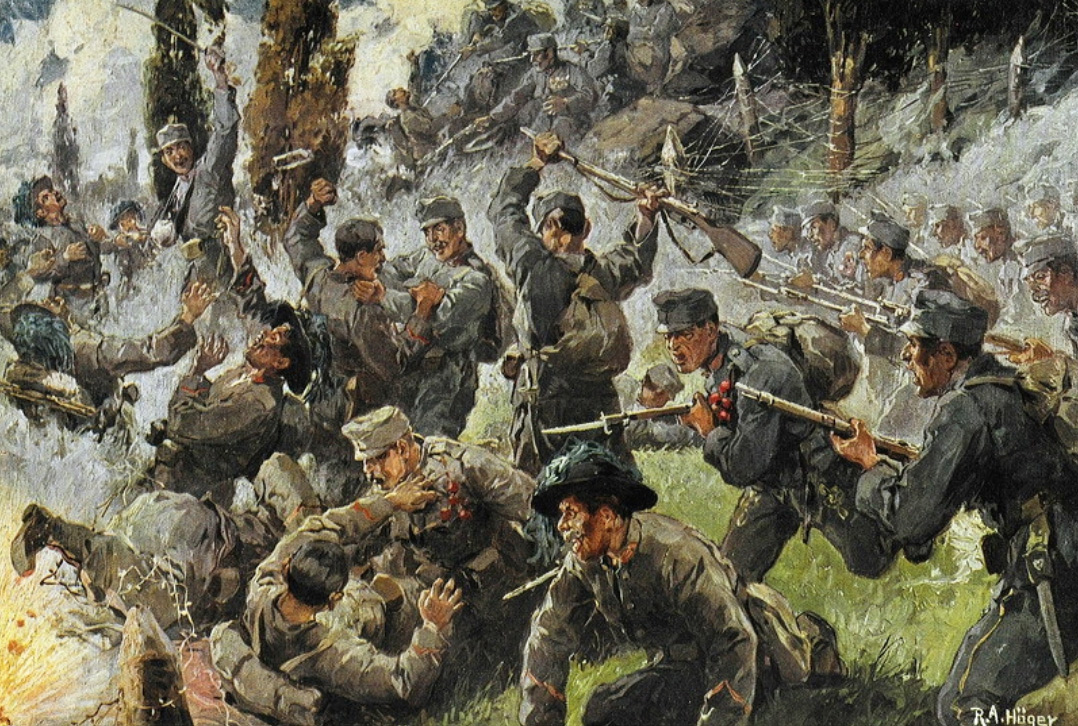 World War I, also known as the First World War, or the Great War, was a global war originating in Europe that lasted from 28 July 1914 to 11 November 1918. More than 70 million military personnel, including 60 million Europeans, were mobilized in one of the largest wars in history. The war drew in all the world's economic great powers, assembled in two opposing alliances: the Allies versus the Central Powers of Germany and Austria-Hungary. View World War I », and the Nazis, ironically enough, glorified him as a great German leader pre-figuring Hitler, but his reputation in both East and West Germany became far less favorable after the fall of the Nazi
World War I, also known as the First World War, or the Great War, was a global war originating in Europe that lasted from 28 July 1914 to 11 November 1918. More than 70 million military personnel, including 60 million Europeans, were mobilized in one of the largest wars in history. The war drew in all the world's economic great powers, assembled in two opposing alliances: the Allies versus the Central Powers of Germany and Austria-Hungary. View World War I », and the Nazis, ironically enough, glorified him as a great German leader pre-figuring Hitler, but his reputation in both East and West Germany became far less favorable after the fall of the Nazi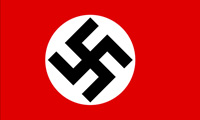 Nazi Germany (officially known as the German Reich from 1933 until 1943, and the Greater German Reich from 1943 to 1945) was the German state between 1933 and 1945, when Adolf Hitler and the Nazi Party controlled the country, transforming it into a dictatorship. Under Hitler's rule, Germany quickly became a totalitarian state where nearly all aspects of life were controlled by the government. regime, largely due to his status as a favorite icon of the Nazis. However, by the 21st century, a re-evaluation of his legacy as a great general and enlightened monarch returned opinion of him to favour.
Nazi Germany (officially known as the German Reich from 1933 until 1943, and the Greater German Reich from 1943 to 1945) was the German state between 1933 and 1945, when Adolf Hitler and the Nazi Party controlled the country, transforming it into a dictatorship. Under Hitler's rule, Germany quickly became a totalitarian state where nearly all aspects of life were controlled by the government. regime, largely due to his status as a favorite icon of the Nazis. However, by the 21st century, a re-evaluation of his legacy as a great general and enlightened monarch returned opinion of him to favour.
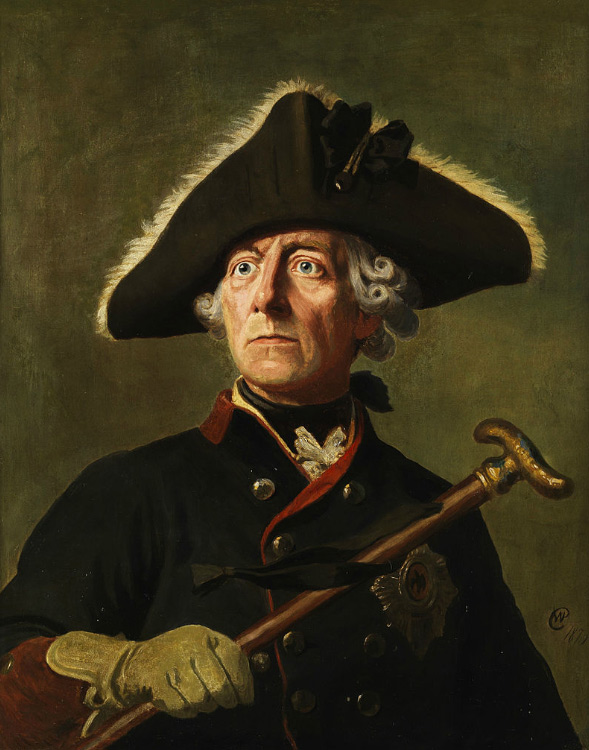
Frederick the Great, by Wilhelm Camphausen
Youth
Frederick, the son of Frederick William I and his wife, Sophia Dorothea of Hanover, was born in Berlin on 24 January 1712. He was baptised with only one name, Friedrich, and was not given any other names. The birth of Frederick was welcomed by his grandfather, Frederick I, with more than usual pleasure, as his two previous grandsons had both died in infancy. With the death of his father in 1713, Frederick William became King in Prussia, thus making young Frederick the crown prince. The new king wished for his sons and daughters to be educated not as royalty, but as simple folk. He had been educated by a Frenchwoman, Madame de Montbail, who later became Madame de Rocoulle, and he wished that she educate his children.
Frederick William I, popularly dubbed as the Soldier-King, had created a large and powerful army led by his famous "Potsdam Giants", carefully managed his treasury finances and developed a strong, centralized government. However, he also possessed a violent temper (in part due to porphyritic illness) and ruled Brandenburg-Prussia with absolute authority. As Frederick grew, his preference for music, literature and French culture clashed with his father's militarism, resulting in Frederick William frequently beating and humiliating him. In contrast, Frederick's mother Sophia was polite, charismatic and learned. Her father, George Louis of Brunswick-Lüneburg, succeeded to the British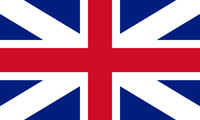 The Kingdom of Great Britain was a sovereign country in Western Europe from 1 May 1707 to the end of 31 December 1800. The state was created by the 1706 Treaty of Union and ratified by the Acts of Union 1707, which united the kingdoms of England (which included Wales) and Scotland to form a single kingdom encompassing the whole island of Great Britain and its outlying islands, with the exception of the Isle of Man and the Channel Islands. throne as King George I in 1714.
The Kingdom of Great Britain was a sovereign country in Western Europe from 1 May 1707 to the end of 31 December 1800. The state was created by the 1706 Treaty of Union and ratified by the Acts of Union 1707, which united the kingdoms of England (which included Wales) and Scotland to form a single kingdom encompassing the whole island of Great Britain and its outlying islands, with the exception of the Isle of Man and the Channel Islands. throne as King George I in 1714.
Frederick was brought up by Huguenot governesses and tutors and learned French and German simultaneously. In spite of his father's desire that his education be entirely religious and pragmatic, the young Frederick, with the help of his tutor Jacques Duhan, procured for himself a three thousand volume secret library of poetry, Greek and Roman classics, and French philosophy to supplement his official lessons.
Although Frederick William I was raised a Calvinist, he feared he was not of the elect. To avoid the possibility of Frederick being motivated by the same concerns, the king ordered that his heir not be taught about predestination. Nevertheless, although Frederick was largely irreligious, he to some extent appeared to adopt this tenet of Calvinism. Some scholars have speculated that he did this to spite his father.
Reign (1740–1786)
Prince Frederick was twenty-eight years old when his father Frederick William I died and he ascended to the throne of Prussia. Before his accession, Frederick was told by D'Alembert, "The philosophers and the men of letters in every land have long looked upon you, Sire, as their leader and model." Such devotion, however, had to be tempered by political realities. When Frederick ascended the throne as "King in Prussia" in 1740, Prussia consisted of scattered territories, including Cleves, Mark, and Ravensberg in the west of the Holy Roman Empire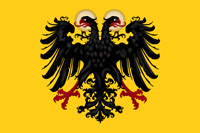 The Holy Roman Empire was a political entity in Western, Central, and Southern Europe that developed during the Early Middle Ages and continued until its dissolution in 1806 during the Napoleonic Wars. From the accession of Otto I in 962 until the twelfth century, the Empire was the most powerful monarchy in Europe. The empire reached the apex of territorial expansion and power in the mid-thirteenth century, but overextending led to partial collapse.; Brandenburg, Hither Pomerania, and Farther Pomerania in the east of the Empire; and the Kingdom of Prussia, the former Duchy of Prussia, outside of the Empire bordering the Polish–Lithuanian Commonwealth. He was titled King in Prussia because this was only part of historic Prussia; he was to declare himself King of Prussia after acquiring most of the rest in 1772.
The Holy Roman Empire was a political entity in Western, Central, and Southern Europe that developed during the Early Middle Ages and continued until its dissolution in 1806 during the Napoleonic Wars. From the accession of Otto I in 962 until the twelfth century, the Empire was the most powerful monarchy in Europe. The empire reached the apex of territorial expansion and power in the mid-thirteenth century, but overextending led to partial collapse.; Brandenburg, Hither Pomerania, and Farther Pomerania in the east of the Empire; and the Kingdom of Prussia, the former Duchy of Prussia, outside of the Empire bordering the Polish–Lithuanian Commonwealth. He was titled King in Prussia because this was only part of historic Prussia; he was to declare himself King of Prussia after acquiring most of the rest in 1772.
Military Theorist
Contrary to what his father had feared, Frederick proved himself very courageous in battle (with the exception of his first battlefield experience, Mollwitz). He frequently led his military forces personally and had six horses shot from under him during battle. During his reign he commanded the Prussian Army at sixteen major battles (most of which were victories for him) and various sieges, skirmishes and other actions. He is often admired as one of the greatest tactical geniuses of all time, especially for his usage of the oblique order of battle, in which attack is focused on one flank of the opposing line, allowing a local advantage even if his forces were outnumbered overall (which they often were). Even more important were his operational successes, especially preventing the unification of numerically superior opposing armies and being at the right place at the right time to keep enemy armies out of Prussian core territory.
An example of the place that Frederick holds in history as a ruler is seen in Napoleon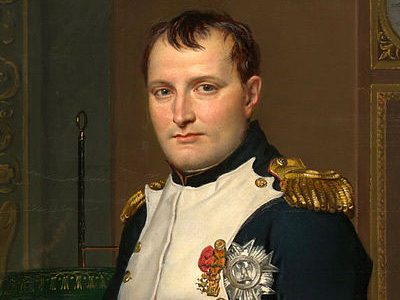 Napoleon Bonaparte (1769-1821), was a French military and political leader who rose to prominence during the French Revolution and led several successful campaigns during the French Revolutionary Wars. As Napoleon I, he was Emperor of the French from 1804 until 1814, and again in 1815. One of the greatest commanders in history, his wars and campaigns are studied at military schools worldwide. Napoleon Bonaparte » who saw the Prussian king as the greatest tactical genius of all time; after Napoleon's victory of the Fourth Coalition in 1807, he visited Frederick's tomb in Potsdam and remarked to his officers, "Gentlemen, if this man were still alive I would not be here". Napoleon frequently "pored through Frederick's campaign narratives and had a statuette of him placed in his personal cabinet." Frederick and Napoleon are perhaps the most admiringly quoted military leaders in Clausewitz' On War. More than Frederick's use of the oblique order, Clausewitz praised particularly the quick and skillful movement of his troops.
Napoleon Bonaparte (1769-1821), was a French military and political leader who rose to prominence during the French Revolution and led several successful campaigns during the French Revolutionary Wars. As Napoleon I, he was Emperor of the French from 1804 until 1814, and again in 1815. One of the greatest commanders in history, his wars and campaigns are studied at military schools worldwide. Napoleon Bonaparte » who saw the Prussian king as the greatest tactical genius of all time; after Napoleon's victory of the Fourth Coalition in 1807, he visited Frederick's tomb in Potsdam and remarked to his officers, "Gentlemen, if this man were still alive I would not be here". Napoleon frequently "pored through Frederick's campaign narratives and had a statuette of him placed in his personal cabinet." Frederick and Napoleon are perhaps the most admiringly quoted military leaders in Clausewitz' On War. More than Frederick's use of the oblique order, Clausewitz praised particularly the quick and skillful movement of his troops.
Frederick the Great's most notable and decisive military victories on the battlefield were the Battles of Hohenfriedberg, fought during the War of Austrian Succession in June 1745; the Battle of Rossbach, where Frederick defeated a combined Franco-Austrian army of 41,000 with a mere 21,000 soldiers (10,000 dead for the Franco-Austrian side with only 550 casualties for Prussia); and the Battle of Leuthen, which was a follow up victory to Rossbach pitting Frederick's 36,000 troops against Charles of Lorraine's Austrian force of 80,000—Frederick's masterful strategy and tactics at Leuthen inflicted 7,000 casualties upon the Austrians and yielded 20,000 prisoners.
Frederick the Great believed that creating alliances was necessary, as Prussia did not have the comparable resources of nations like France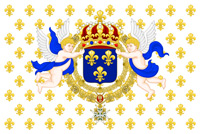 The Kingdom of France is the historiographical name or umbrella term given to various political entities of France in the medieval and early modern period. It was one of the most powerful states in Europe since the High Middle Ages. It was also an early colonial power, with possessions around the world. Colonial conflicts with Great Britain led to the loss of much of its North American holdings by 1763. The Kingdom of France adopted a written constitution in 1791, but the Kingdom was abolished a year later and replaced with the First French Republic. or Austria. After the Seven Years' War, the Prussian military acquired a formidable reputation across Europe. Esteemed for their efficiency and success in battle, the Prussian army of Frederick became a model emulated by other European powers, most notably by Russia
The Kingdom of France is the historiographical name or umbrella term given to various political entities of France in the medieval and early modern period. It was one of the most powerful states in Europe since the High Middle Ages. It was also an early colonial power, with possessions around the world. Colonial conflicts with Great Britain led to the loss of much of its North American holdings by 1763. The Kingdom of France adopted a written constitution in 1791, but the Kingdom was abolished a year later and replaced with the First French Republic. or Austria. After the Seven Years' War, the Prussian military acquired a formidable reputation across Europe. Esteemed for their efficiency and success in battle, the Prussian army of Frederick became a model emulated by other European powers, most notably by Russia Russian Empire was an empire and the final period of the Russian monarchy from 1721 to 1917, ruling across large parts of Eurasia. The rise of the Russian Empire coincided with the decline of neighbouring rival powers: the Swedish Empire, the Polish–Lithuanian Commonwealth, Qajar Iran, the Ottoman Empire, and Qing China. Russia remains the third-largest empire in history, surpassed only by the British Empire and the Mongol Empire. and France; the latter of which quickly applied the lessons of Frederick's military tactics under the direction of Napoleon Bonaparte upon their erstwhile European neighbors.
Russian Empire was an empire and the final period of the Russian monarchy from 1721 to 1917, ruling across large parts of Eurasia. The rise of the Russian Empire coincided with the decline of neighbouring rival powers: the Swedish Empire, the Polish–Lithuanian Commonwealth, Qajar Iran, the Ottoman Empire, and Qing China. Russia remains the third-largest empire in history, surpassed only by the British Empire and the Mongol Empire. and France; the latter of which quickly applied the lessons of Frederick's military tactics under the direction of Napoleon Bonaparte upon their erstwhile European neighbors.
Frederick was an influential military theorist whose analysis emerged from his extensive personal battlefield experience and covered issues of strategy, tactics, mobility and logistics. Austrian co-ruler Emperor Joseph II wrote, "When the King of Prussia speaks on problems connected with the art of war, which he has studied intensively and on which he has read every conceivable book, then everything is taut, solid and uncommonly instructive. There are no circumlocutions, he gives factual and historical proof of the assertions he makes, for he is well versed in history."
Historian Robert M. Citino describes Frederick's strategic approach:
In war...he usually saw one path to victory, and that was fixing the enemy army in place, maneuvering near or even around it to give himself a favorable position for the attack, and then smashing it with an overwhelming blow from an unexpected direction. He was the most aggressive field commander of the century, perhaps of all time, and one who constantly pushed the limits of the possible.
Historian Dennis Showalter argues, "The King was also more consistently willing than any of his contemporaries to seek decision through offensive operations."
Foresight ranked among the most important attributes when fighting an enemy, according to the Prussian monarch, as the discriminating commander must see everything before it takes place, so "nothing will be new to him." Thus it was flexibility that was often paramount to military success. Donning both the skin of a fox or a lion in battle, as Frederick once remarked, reveals the intellectual dexterity he applied to the art of warfare.
Much of the structure of the more modern German General Staff owed its existence and extensive structure to Frederick, along with the accompanying power of autonomy given to commanders in the field. According to Citino, "When later generations of Prussian-German staff officers looked back to the age of Frederick, they saw a commander who repeatedly, even joyfully, risked everything on a single day's battle – his army, his kingdom, often his very life." As far as Frederick was concerned, there were two major battlefield considerations – speed of march and speed of fire. So confident in the performance of men he selected for command when compared to those of his enemy, Frederick once quipped, "A general considered audacious in another country is only ordinary in [Prussia]; [our general] is able to dare and undertake anything it is possible for men to execute."
Even the later military reputation of Prussia under Bismarck and Moltke rested on the weight of mid-eighteenth century military developments and the territorial expansion of Frederick the Great. Despite his dazzling success as a military commander, Frederick was no fan of protracted warfare, and once wrote, "Our wars should be short and quickly fought… A long war destroys … our [army's] discipline; depopulates the country, and exhausts our resources." Martial adeptness and that thoroughness and discipline so often witnessed on the battlefield was not correspondingly reflected on the domestic front for Frederick. In lieu of his military predilections, Frederick administered his Kingdom justly and ranks among the most "enlightened" monarchs of his era; this, notwithstanding the fact that in many ways, "Frederick the Great represented the embodiment of the art of war". Consequently, Frederick continues to be held in high regard as a military theorist the world over.
Later Years and Death
In 1785, Frederick signed a Treaty of Amity and Commerce with the United States of America, recognizing the independence of the new nation. The agreement included a novel clause, whereby the two leaders of the executive branches of either country guaranteed a special and humane detention for prisoners of war.
Near the end of his life, Frederick grew increasingly solitary. His circle of close friends at Sanssouci gradually died off with few replacements, and Frederick became increasingly critical and arbitrary, to the frustration of the civil service and officer corps. The populace of Berlin always cheered the king when he returned to the city from provincial tours or military reviews, but Frederick evinced little pleasure from his popularity with the common people, preferring instead the company of his pet Italian greyhounds, whom he referred to as his "marquises de Pompadour" as a jibe at the French royal mistress. Even in his late 60s and early 70s when his health was increasingly poor, he rose before dawn, drank six to eight cups of coffee a day, "laced with mustard and peppercorns", and attended to state business with characteristic tenacity.
On the morning of 17 August 1786, Frederick died in an armchair in his study at Sanssouci, aged 74. He left instructions that he should be buried next to his greyhounds on the vineyard terrace, on the side of the corps de logis of Sanssouci. His nephew and successor Frederick William II instead ordered the body to be entombed next to his father in the Potsdam Garrison Church. Near the end of World War II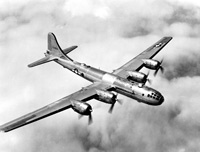 World War II or the Second World War, often abbreviated as WWII or WW2, was a world war that lasted from 1939 to 1945. It involved the vast majority of the world's countries—including all of the great powers—forming two opposing military alliances: the Allies and the Axis powers. World War II was a total war that directly involved more than 100 million personnel from more than 30 countries. World War II is generally considered to have begun on 1 September 1939, when Nazi Germany, under Adolf Hitler, invaded Poland. View World War II », Hitler ordered Frederick's coffin, along with those of his father Frederick William I, World War I Field Marshal Paul von Hindenburg, and Hindenburg's wife Gertrud, to be hidden in a salt mine as protection from destruction. The United States Army relocated the remains to Marburg in 1946; in 1953, the coffins of Frederick and his father were moved to Burg Hohenzollern.
World War II or the Second World War, often abbreviated as WWII or WW2, was a world war that lasted from 1939 to 1945. It involved the vast majority of the world's countries—including all of the great powers—forming two opposing military alliances: the Allies and the Axis powers. World War II was a total war that directly involved more than 100 million personnel from more than 30 countries. World War II is generally considered to have begun on 1 September 1939, when Nazi Germany, under Adolf Hitler, invaded Poland. View World War II », Hitler ordered Frederick's coffin, along with those of his father Frederick William I, World War I Field Marshal Paul von Hindenburg, and Hindenburg's wife Gertrud, to be hidden in a salt mine as protection from destruction. The United States Army relocated the remains to Marburg in 1946; in 1953, the coffins of Frederick and his father were moved to Burg Hohenzollern.
On the 205th anniversary of his death, on 17 August 1991, Frederick's casket lay in state in the court of honor at Sanssouci, covered by a Prussian flag and escorted by a Bundeswehr guard of honor. After nightfall, Frederick's body was finally laid to rest in the terrace of the vineyard of Sanssouci – in the still existing crypt he had built there – without pomp, in accordance with his will.
HISTORY
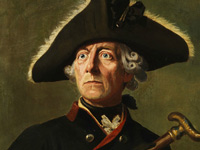
RESOURCES
This article uses material from the Wikipedia article "Frederick the Great (1712-1786)", which is released under the Creative Commons Attribution-Share-Alike License 3.0.
© Stories Preschool. All Rights Reserved.
